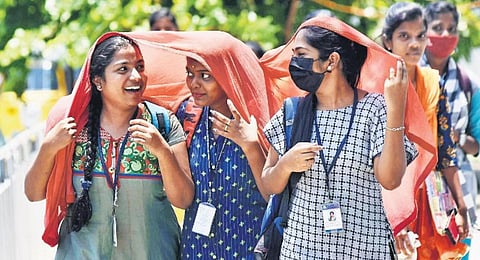

CHENNAI: In fear of the threat raised by rising global temperature to the economy, the Tamil Nadu government has decided to develop an action plan that could transform the urban planning and design of buildings. The state is coming out with an action plan as it is located in the vulnerable part of the Indian Peninsula and is subjected to climate and geological disasters like cyclones, floods, earthquakes, tsunamis and drought.
The action plan, being prepared under the guidance of the State Planning Commission by involving the state departments, research institutions, civil society organizations and institutions of national and international expertise, will focus on improving conventional cooling by increasing the efficiency of air conditioning and refrigeration equipment. It will also focus on green roofs, cool roofs, and cool pavements. As per sources, the first working committee meeting is scheduled for this week.
Sources said the state planning department has come out with a concept note on mitigation of heat, which is linked with economic growth and is recognised as key to the health, well-being, and productivity of people in hot climates. According to a concept note accessed by TNIE, increasing heat causes a large cooling demand across sectors such as buildings, cold-chain, refrigeration and transport. As per the International Energy Agency (IEA), refrigeration and air conditioning causes 10% of the global CO2 emissions. As of now, only 9% of Indian households have air conditioning, but this demand is projected to increase 20-fold by 2050.
“Under business-as-usual, this translates into huge emissions and energy problems, as room air conditioners will alone account for one-quarter of India’s emissions and 45% of nationwide peak electricity demand in 2050. This in turn risks deadly power outages as both temperatures and electricity demand surge during India’s more frequent and intense heat waves,” the report states.
As a result, the state could go in for adoption and enforcement of the Energy Conservation Building Code (ECBC) for both commercial and residential sectors at the municipal urban and local body levels and through the development of a level action plan, sources said. The report stated that the number of persons living in urban areas will continue to increase at a faster rate than the population in rural areas due to increasing urbanisation in Tamil Nadu.
“The concurrence of heat and drought events are causing crop production losses and tree mortality. The risks to health and food production will be more severe by the sudden food production losses exacerbated by heat-induced labour productivity losses. These interacting impacts will increase food prices, reduce household incomes, and lead to malnutrition and climate-related deaths, especially in tropical regions,” the concept note stated.
As per an ILO report of 2019, India lost around 4.3% of working hours due to heat stress and is expected to lose 5.8% of working hours in 2030. It also shows 9.04% of working hours are expected to be lost each in agriculture and construction sector in 2030. “Workers in sectors like agriculture and construction will be severely impacted in 2030 as India’s large population depends on them for their livelihoods. In absolute terms, India is likely to lose around 34 million full-time jobs in 2030 due to heat stress,” report stated.